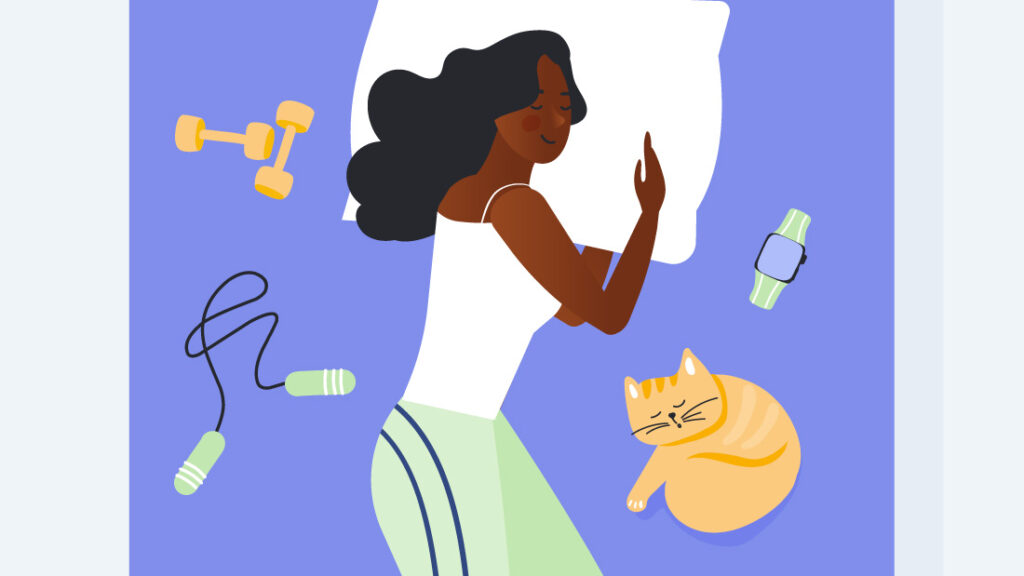
Excellent nutrition. Rigorous workouts. Sleepless nights? The top elite athletes might be struggling just as much, or even more, than the rest of us when it comes to poor sleep. In a 2024 Swiss study, researchers found that two thirds of elite athletes experience poor sleep and 30 percent of athletes expressed their dissatisfaction with their sleep quality. (1)
Why Athletes Don’t Sleep Well; Study’s Findings
Other key findings of the research indicate that athletes of individual sports slept longer than athletes who were part of team sports. The study also found that 17 percent of athletes struggled to fall asleep in 30 minutes on a regular basis and 18 percent of athletes struggled to stay asleep at least three nights a week.
While athletes themselves, and their coaches, might think strength and conditioning is the way to prevent injury, it might be more complicated, yet so basic — the researchers noted that athletes can reduce their risk of injury by 61 percent by getting at least 8 hours of sleep each night and following sleep recommendations. So, sleep matters greatly to athletes.
This research comes after other previous studies about sleep and athletes, including another 2023 Swiss study concluding relaxation intervention and mindfulness can help lower anxiety levels and sleep issues in teen athletes. (2) A 2023 systemic review found that an increase in sleep duration, including naps, was associated with improved physical and cognitive performance amongst athletes, and was the most effective way to do so. (3)
So why are athletes struggling to sleep? It varies for them, like it does for everyone else, but some top causes are likely intense pressure to perform and succeed, additional injuries, aches and pains, and unpredictable travel schedules for competitions. For example, Los Angeles Dodgers star Shohei Ohtani shared in May that issues with someone close to him stealing money kept him up at night. In addition, athletes headed to the 2024 summer Olympics in France might experience significant issues with jetlag, compounding already existing anxiety. They have specialists on their teams helping them determine the best way to combat those issues and prioritize sleep.
If you are just a weekend warrior and far from an Olympian, or if you have a daily exercise routine, you can follow best practices with sleep hygiene related to movement, which largely will help with sleep, not hinder it. Experts recommend:
- Not doing rigorous workouts right before bedtime, as all that adrenaline would keep anyone awake
- Utilizing a calm down routine involving lowered lights, minimal screens, and a book or other pastime
- Heading outside in the morning for workouts when possible to regulate your circadian rhythm
- Gradually shift your sleep schedule to a new time zone if you are traveling for an athletic event, be it your own or your kid’s travel ball team
- Be consistent with exercise, one of the most healthy and natural sleep aids around
- Consider if athletics might actually mean you need more sleep than someone who doesn’t exercise as much
Even if you will only ever see the stress and glory of elite athletics from the comfort of your couch, learning from their sleep struggles can improve your own as well through these tips.
Sources
1. Vorster APA, Erlacher D, Birrer D, Röthlin P. Sleep Difficulties in Swiss Elite Athletes. Life. 2024; 14(6):779. https://doi.org/10.3390/life14060779
2. Johles, L., Norell, A., Lundqvist, C. et al. Is a Brief Body Scan Helpful for Adolescent Athletes’ Sleep Problems and Anxiety Symptoms?. Mindfulness 14, 1522–1530 (2023). https://doi.org/10.1007/s12671-023-02149-w
3. Cunha, L.A., Costa, J.A., Marques, E.A. et al. The Impact of Sleep Interventions on Athletic Performance: A Systematic Review. Sports Med – Open 9, 58 (2023). https://doi.org/10.1186/s40798-023-00599-z


























